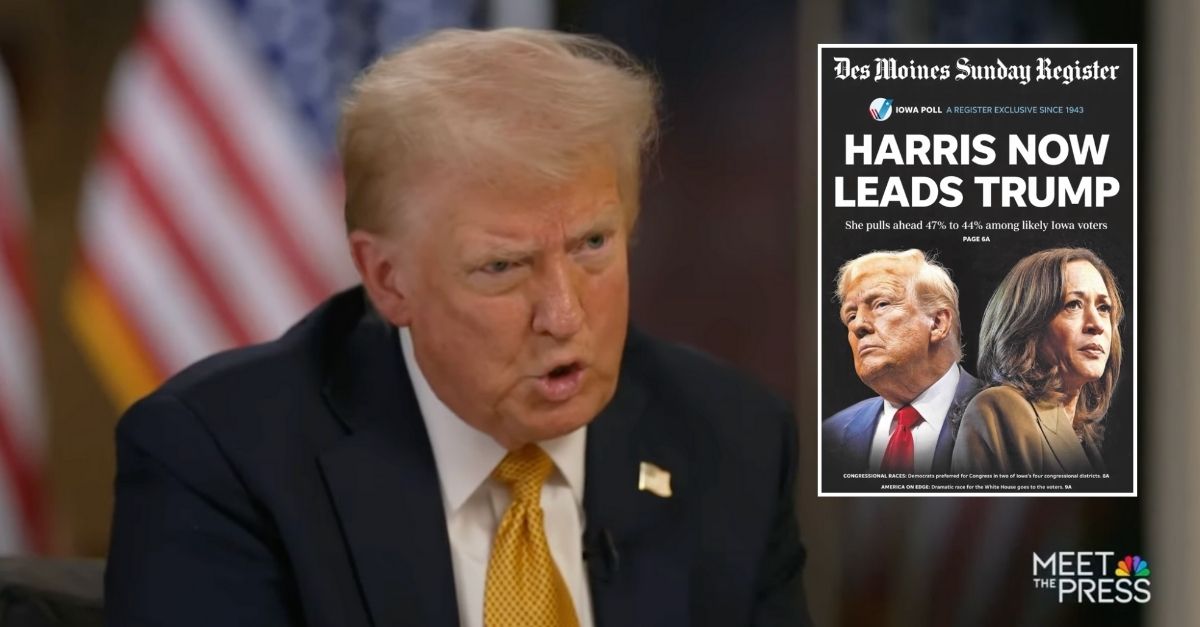
Inset: The Des Moines Register’s coverage of the J. Ann Selzer poll named in Donald Trump’s lawsuit (Trump v. Selzer complaint). Background: Donald Trump (NBC News).
Veteran Iowa pollster J. Ann Selzer on Friday implored a federal judge to dismiss the lawsuit filed against her and The Des Moines Register newspaper by Donald Trump over a poll published ahead of the 2024 presidential election that predicted Vice President Kamala Harris had a slight lead in the race.
In a 30-page filing, Selzer’s attorneys excoriate Trump’s lawsuit, arguing that Trump’s theory of liability “would eviscerate the First Amendment” and is “both stupid and very likely unconstitutional.”
In a poll released three days before the election, Selzer had predicted that Harris had about a three-point lead over then-candidate Trump. Trump went on to win the state by about 13 points. The lawsuit, initially filed in December 2024 under an Iowa law against “consumer fraud,” accuses Selzer and the Register of being in cahoots with “cohorts in the Democrat Party” who “hoped that the Harris Poll would create a false narrative of inevitability for Harris in the final week of the 2024 Presidential Election.”
It seeks damages and a court order to prevent the newspaper from publishing any future “deceptive polls” that might “poison the electorate.”
Selzer is represented in the litigation by attorney Robert Corn-Revere of the nonprofit free speech advocacy group the Foundation for Individual Rights and Expression (FIRE).
In a 30-page motion seeking to dismiss the case, Selzer vehemently asserts that Trump’s lawsuit is an affront to constitutionally protected free speech.
“Plaintiffs’ claims are barred by the First Amendment and the Court should dismiss them with prejudice,” the filing says. “In the United States there is no such thing as a claim for ‘fraudulent news.’ No court in any jurisdiction has ever held such a cause of action might be valid, and few plaintiffs have ever attempted to bring such outlandish claims. There is good reason for this. History’s judgment repudiated the 1798 Sedition Act which prohibited ‘false, scandalous and malicious … writings against the government of the United States’ or its president, and that fraught episode ‘first crystallized a national awareness of the central meaning of the First Amendment.’”
The filing cites to U.S. Supreme Court precedent stating that speech is “presumptively protected” unless it falls within one of several limited and “narrowly defined” categories. Selzer argues that Trump’s lawsuit seeks to “illegitimately expand” those categories to include “fake news,” asserting that such an idea “has no place in America’s constitutional jurisprudence.”
“Even if such a cause of action existed, the Amended Complaint is fatally flawed on every level,” the filing states. “No court has ever accepted claims like these, and this Court should not be the first.”
Selzer’s attorney proclaims that the court would be wrong to suddenly permit Trump to force his claim of “fake news” into an existing category of free speech that is actionable, writing:
Plaintiffs try to shoehorn their claims into an existing category by calling the Iowa Poll “fake” and asserting actionable “fraud” occurred. But “in the famous words of Inigo Montoya from the movie The Princess Bride, “You keep using that word. I do not think it means what you think it means.” As a matter of basic law, Plaintiffs’ allegations about polls and news stories they dislike have nothing to do with fraud. They also sprinkle the complaint with loose talk of “election interference,” although they stop short of including a separate claim on that basis, perhaps out of awareness that “no court has held that a scheme to rig an election itself constitutes money or property fraud.”
The lawsuit was one of a flurry of actions initiated by Trump after winning the 2024 election, including defamation suits against ABC and star anchor George Stephanopoulos that controversially settled for $15 million and another in which the president is seeking $20 billion from CBS over a 60 Minutes segment featuring Harris that he claimed was “doctored.”
The suit against Selzer has long been panned by legal experts who have criticized it as an effort to impose a financial burden on Selzer and the newspaper.
“I don’t expect this lawsuit to go anywhere,” Rick Hasen, an election law expert and professor at UCLA School of Law, wrote after it was filed.








